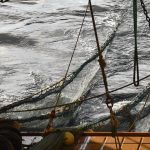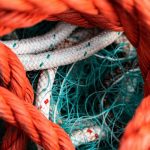The letter asks the auction to inform NOAA by June 24 if there is any legal reason it should not face the sanction. If there is none, the letter asks the auction to determine when – between now and July 13 – it will begin its 10-day sanction.
NOAA is providing advance notice of the requirement to serve the 10-day sanction in order to give the Gloucester auction the opportunity to notify the fishermen so they can make alternate arrangements for selling additional catches, as well as give the auction time to sell the catch it currently has in-house before the sanction takes effect.
The auction was found to have purchased illegal cod on nine occasions, totaling 20,691 pounds, during a three-month period from July to September of 2000. In addition, the auction was found to have falsified 35 records in an attempt to cover up those illegal purchases. The auction was assessed a civil penalty of $125,000 and a 60-day permit sanction because of the severity of the violations.
In 2003, the Gloucester auction settled with NOAA, and ultimately agreed to a reduced 15-day permit sanction as one of the penalties for these violations. Permits are required to buy, possess, or sell any federally regulated fish commercially. When a permit is sanctioned, it means that the holder cannot conduct the activities that the permit authorized.
NOAA further agreed to suspend 10 days of the original 15-day sanction as long as no further substantial violations occurred within a one-year probation period after the settlement.
In February 2004, less than six months into the probationary period, the auction committed a new violation for maintaining a false record that omitted illegally landed cod. In 2005, NOAA found that the auction committed this second violation.
The Gloucester auction appealed the charge, but in April 2009, NOAA upheld its decision. Because the auction violated its probation, NOAA is now notifying the auction it must comply with the 2003 agreement’s terms and serve the 10-day sanction, effectively shutting down the auction to federally managed fish for 10 days.
NOAA will continue to work with the New England fishing community to build a sustainable fishery. Compliance with fishery laws and regulations is critical to the success of our joint efforts. To achieve this goal, we both must ensure that regulations are followed and if not, that effective enforcement deters illegal fishing activities. It is unfair to those fishermen who abide by the rules to allow others to evade them without penalty.
NOAA understands and predicts changes in the Earth’s environment, from the depths of the ocean to the surface of the sun, and conserves and manages our coastal and marine resources.








